- Home
- Jacob Peppers
A Warrior's Burden: Book One of Saga of the Known Lands Page 5
A Warrior's Burden: Book One of Saga of the Known Lands Read online
Page 5
He turned to see that the final one had sprinted away, back in the direction of his forces, no doubt intending to get help, to tell them of this demon he and his companions had found in the driving snow. But demons were not so easily escaped, that Cutter knew, for he had more than his share. He knelt calmly beside the legless man, his screams now a low, pleading moan, and withdrew a hatchet from where it was sheathed at the man’s belt. Then he turned, watching the back of the fleeing man.
The driving snow and poor light did much to obscure his form, making of him a vague outline that could have been anyone, anyone at all. Cutter pivoted, bringing the hatchet back over his head and with a grunt, spun, letting it go. It struck the running man in the center of his back, the blade digging in, and the figure in the distance screamed as his back arced in pain, before collapsing.
The old him might have been pleased at this victory, but Cutter felt no pleasure, had not felt any in years. He felt only a need, the need which had driven him to Brighton in the first place, the need—ill-defined even to himself—which had made him always refuse the temptation to take his own life. He looked at the sword he still held, coated in blood, then he sighed and started after the final man.
The man was moving slowly, hobbling a few steps only to stumble and fall, shooting glances back each time which showed his terror even in the poor visibility. In a few minutes, Cutter was on him, staring down. He didn’t know what he felt, in that moment, knew only that it was not victorious. The man couldn’t find the strength to rise now and was busy scraping at the snow, dragging himself forward, fighting the inevitable as sure as every man did when his time came around. And that time, Cutter knew, always came around.
“Let it go,” Cutter said. “It’s done with now.”
The man didn’t listen, though, only continuing to drag himself forward, crying and whimpering, his words unintelligible, coated as they were in his own agony.
“You will die before you reach them,” Cutter said, trying again, “even if you were allowed to make the attempt. It is over. You can rest now.”
“P-please,” the man said turning awkwardly on his side to stare at Cutter with eyes as wide as the moon overhead. “Please. Y-you can save me.”
“No. I know nothing of saving. Only killing.”
“Oh gods. Gods help me.”
“Yes,” Cutter said, raising the sword overhead. “Gods help us both.”
CHAPTER SIX
Guilt always tastes better on a full stomach.
—Common saying of the Known Lands
Matt, or Matty as his mother called him, woke to the smell of meat cooking. It was a good, pleasant smell, familiar, too, and for a time he forgot the past day’s events, thought he was at his mother’s house once more, and the smell was that of her cooking. She had always loved to cook, his mother, before the sickness took her and robbed her of her strength. She had been great at it, too, and plenty of days had seen the villagers of Brighton making some excuse to come by around meal time. His mother had never turned them out, had only welcomed them before turning to him, offering him the smile she had always reserved for him and him alone. “Matty, look, it seems we’ll be having company for supper, how’s that?” she’d say.
He could hear her voice, even then, and he felt himself smiling in response. But then he opened his eyes—a job made more difficult than normal for all the frost accumulated on his face—and saw that the previous day’s events had not been some terrible dream after all. He lay in a bed roll, all of him covered in thick blankets save his face. Snow was falling all around him, and he turned to see that the smell he’d detected wasn’t his mother’s cooking after all but Cutter. The man’s massive back was to him as he tended the fire. Not his mother, then, and he was Matty no longer. He had always hated it when she’d called him that, always thought it had sounded like a kid’s name. Now, though, he thought he would do anything to hear her say it one more time. But she never would, would never say anything again, and there would be no more visitors from Brighton, for the village was as dead as his mother. Or at least, the woman who had pretended to be his mother, only, according to Cutter, because she’d been paid for the trouble.
The anger washed away the last vestiges of sleep. Had she only ever pretended to love him? Had he only ever imagined that smile, the one that he had thought meant she loved him? And what of his father? He had spent years crying for him after he died—how long had he spent counting the coins he’d been paid to take Matt in?
“Ah. You’re awake then. Eat.”
Matt was pulled from his thoughts to see that Cutter had turned from the fire and was offering him a bowl of stew. It smelled delicious, and he was all too aware that the sun was beginning to rise on the horizon, meaning it had been nearly twenty-four hours since he’d last eaten, a breakfast he’d prepared himself and whatever talents his mother had when it came to cooking, he had, unfortunately, not inherited them. But of course I wouldn’t have, since she’s not my real mother.
As hungry as he was, he wasn’t yet ready to let his anger go, and he crossed his arms, turning away sullenly. For while his mother and father had been guilty of taking him on for money, it had been Cutter who had paid them to do it, dumping Matt off as if he were no more than some lost mongrel found in the street. “I’m not hungry.”
“Eat anyway,” the man said, reaching it out farther. “It could be the last meal you’ll have in a while. Animals won’t stray close to the Black Woods. Not normal ones anyway. Fact is, we’re lucky to have this squirrel.”
Matt studied the man’s eyes carefully. Cutter had always been kind to him, in his way, but the man always seemed to him to be on the edge of violence. Once, his friend Beldin’s father had bought a dog from a traveling merchant. The dog had seemed kind enough, gentle, even, lazing about mostly, and all of the village kids had loved it—in the outskirts of the world like Brighton, pets were a luxury few could afford. They had loved that dog, doted on it, right up until it had bitten Beldin one day. Matt had been there. Beldin had done nothing to deserve it, had only been walking by the dog, but it had been vicious, exploding at him like a beast, chewing and digging at Beldin’s leg. It had taken over a minute for Beldin’s father to rip the dog free, and Beldin had walked with a limp ever since.
Of course, Beldin would walk with a limp no longer, for he, like the rest of Brighton, was dead. Still, in many ways, Cutter reminded Matt of that dog. He could be kind, could be gentle, but there seemed to be a violence within him, one only waiting to erupt to the surface. His anger, he thought, was like a caged beast, calm and docile on the outside, but on the inside, waiting for its moment, the moment when some careless onlooker might draw too close, the moment when he would lash out. Beldin’s father had put the dog down, but, somehow, Matt did not think he would have found it so easy to do the same with Cutter.
He took the offered bowl.
Cutter studied him for a moment with those cold eyes, eyes that could have hid anything—or nothing. For a moment, Matt thought he might have somehow read his thoughts, thought that the beast might have worked its way free of its cage. The man, though, only grunted and rose, turning to stare back into the falling snow, back toward Brighton.
Matt released a breath he hadn’t realized he was holding, thankful that the big man’s attention was no longer on him, like a weight crushing him. Then, belatedly, he realized what he had failed to notice in his surprise. “You’re…you’re hurt.”
Cutter turned to regard him and, sure enough, he saw the cut on the man’s left arm, the bandage which had been wrapped around it stained lightly with blood. Not a deep cut, then, but a recent one. Cutter grunted again. “It’s nothing.”
“But…what happened?”
The man seemed to consider that, then. “I fell.”
It was a lie, that much was obvious, but it was just as obvious that the man wasn’t going to say anything more. Yet another lie, then, to add to the lies which had made up Matt’s entire life. “You’re not going to
eat?”
“I already did.”
Matt frowned at that, glancing around the fire, but if there was a second bowl, he didn’t see it, and the small pot Cutter had used didn’t appear to be much bigger than Matt’s bowl. Had the man only eaten before him, or had he given it all to Matt? After all, one squirrel wasn’t much split between two people—wasn’t much for one, really, as Matt found that he was still hungry—but he thought there had been a surprising amount of meat in the stew, enough to account for a single squirrel, surely.
And there it was again—that kindness. The kindness he had seen from the man before, a sort of off-handed kindness which he never acknowledged, which he would have likely preferred no one acknowledge. Which was real, then? The anger or the kindness? Both?
“Do you think they’ll catch us?” Matt asked, following the man’s gaze. He could see nothing but snow, everything else more than a few feet ahead obscured from view by the heavy curtain of white, so that the men could have been less than a hundred paces away, and he would have never known it.
“Not before we reach the Black Wood,” he said.
Matt frowned. Yesterday, the man had been sure that they would be caught, but now he seemed confident that they would make it to the woods first. What had changed? Whatever it was, he had a feeling it had something to do with the cut on the man’s arm. Had he gone out in the darkness to hide their trail or lay a false one? Matt knew little of such things, but he thought that it would have been a pointless effort as any false trail he might have made would have likely been covered in snow less than an hour later. So what then?
He wondered at it, but not for long. Mostly, he thought of the Black Wood, of what awaited them there. He’d heard the stories, of course. Everyone had. His own mother—and father, before he’d passed—had refused to tell him any, claiming the stories painted the Fey as evil, like demons, when in truth they were just creatures acting according to their nature as all creatures must. Felmer’s dad, though, had enjoyed telling them, and more often than not, Matt had spent those nights when he’d stayed over at his friend’s house lying awake, terrified, sure that the Fey would appear at any moment and eat his insides or chop off his face and wear it like a mask, the way Felmer’s dad said they had during the war.
A war which, Felmer’s dad told him, wasn’t over, for while a treaty had been signed between the mortals and the Fey following the Fey king’s death, it was said to be an uneasy peace, one in which each side nursed the anger its losses had kindled. There were a thousand creatures which had, barely a lifetime ago, lived in the entire country and which now were said to all lurk inside the Black Woods, plotting their revenge for being driven from their lands. Boughdins and Berdocks, Walers and Wuvias, and a thousand others. All manner of creatures of all shapes and all sizes, yet all of them, according to Felmer’s dad, sharing one very particular, very nasty characteristic—the consuming of human flesh.
Matt felt a chill run up his spine at that, one he could not wholly blame on the cold no matter how much he might want to. He glanced up at Cutter who was now packing everything away for the journey. If the man felt any fear at the prospect of entering the Wood, he did a good job of hiding it.
“Finished?” Cutter asked, glancing at him and holding his hand out for the bowl.
In truth, Matt could have eaten another two bowls just like the first, but considering that there was nothing left and that he was more than a little sure that the man had foregone his own meal so that he might eat, he tried a smile. “Yes, thank you. It was good.”
Cutter grunted—it seemed the man had a policy not to waste any words when a grunt would do—then took the bowl, stowing it in the pack.
Matt moved to help him, but Cutter waved him away. “Get your fur coat—the one in your pack. There’s a freeze coming.” He paused, sniffing the air, once again putting Matt in mind of some predator, perhaps one questing for prey. “Won’t be long now.”
“Okay,” Matt said. He walked over to his pack and withdrew the fur coat he’d placed inside the night before when he’d lain down to sleep. Then he paused, looking at it, a stab of sadness, sharp as a razor, cutting through him. His mother had made him the coat years ago, from a bear Cutter had killed. It was a fine one, finer than any of the fur coats any of the other villagers had, for his mother had been as skilled with a needle and thread as she had been a cooking pot and spices. Tears were running down his cheeks before he realized it, and he wasn’t sure how long he stood there, only that, after at time, he felt the big man’s hand on his shoulder.
Gentle, but he could feel the strength in it, strength that he thought could have crushed his shoulder if the man had taken it in mind to give it a good squeeze. “Come on, lad,” he said. “We’ve got to go. We’ll need to be in the forest before the snow comes. Might be we can find some shelter.”
“Does it ever stop?” Matt asked, still staring at the coat he held. “The guilt, I mean?”
“Guilt?”
“The villagers,” Matt said, turning on him. “Brighton. My m—the woman who raised me. We let them all die.”
“You have nothin’ to be guilty of, boy. I made you come, remember? Besides, even if you had stayed, you could have done nothing but die with them. That’s the same for both of us.”
Matt nodded slowly. “But does it ever stop?”
Cutter watched him for a moment, those eyes, so pale blue as to be almost white, studying him. “No. But sometimes, you forget it. At least for a while.”
“Only to remember it again?”
“Yes.”
CHAPTER SEVEN
Some men think the Fey evil and therefore believe that their home, the Black Wood, must be evil also.
They are wrong on both counts. The Fey are not evil, not anymore than a winter storm or a summer hurricane is evil.
Not anymore than men might be said to be evil.
Not evil, then. But are they deadly?
Oh yes. In all the worlds, there are few things deadlier than the Fey.
—Exiled Historian to the Crown Petran Quinn excerpt from “Coming to the Known Lands”
It felt as if they walked forever, as if they trudged through some gods-forsaken land of the damned in which there was no rest or comfort. And no warmth, that most of all. Matt had lived his entire life—at least as much of it as he could remember—in Brighton. Had believed, at least until yesterday, that he had been born there and that he would likely die there. And, for the most part, that had been okay, that belief.
But now things were different, everything was different. There was no Brighton, his mother was not his mother, and though he’d spent his entire life in the cold climes of the edges of human civilization and had thought himself largely inured to the miseries such a climate provided, he was realizing that he was wrong. And he was cold. Cold inside and cold outside. It was as if he had forgotten what heat was, as if the world itself had forgotten. There was nothing but the white emptiness, white but somehow dark, too. A white that did not sparkle beautifully but that drained the world of color, of life, and though the land spread out before them in a vast emptiness that a man could get lost in, it was also suffocating, oppressive in a way that was hard to define. Matt had never felt like that before about the snow, but he felt it now. Perhaps the emptiness had always been there, but he only recognized it now because of the emptiness inside him, one that matched it.
It did not help that Cutter had said nothing for the last several hours as they trudged through the ever-thickening blanket of snow which lay across the world, the only sound the crunching of the forest beneath their feet and their ragged breaths. It didn’t make sense to Matt that a man could be cold and hot at the same time, could not feel his nose and face for numbness but could be sweating inside the fur coat his mother—or the woman who had raised him—had made for him. But then, nothing since he’d woken up the day before had made sense, and he was beginning to think—to know—that nothing ever would again.
“How much farther?”
he asked, more for something to say than because he expected any answer.
He wasn’t to be disappointed then as Cutter only glanced back at him, his face a mask which gave away no clue as to his thoughts. “Farther,” he said.
And that was about the best conversation they had for the first half of the day.
There was nothing for him, then, nothing but the snow and his harsh breaths and a companion who said nothing, who didn’t even seem human, but like some automaton taking step after step not because it hopes to reach a destination or because it even wishes to leave another but simply because it knows nothing else. Nothing, then, to distract him from the thoughts which plagued his mind—a confusing jumble of hatred and anger and self-pity mixed with more than his share of guilt and shame. He wanted to scream, wanted to shout that it wasn’t fair and that the gods were devils, really, and that Cutter was the biggest devil of them all. What kept him from it, what silenced the scream before it ever reached his throat was that he was afraid the man would agree with him, and what could you say to such a thing as that? What could anyone say?
Nothing. He had nothing, was part of nothing, belonged to nothing, and when all those things were true what was there to say? Nothing. So he walked, an automaton in his own right, a puppet pulled along by motivations he understood no better than the marionette its strings.
Finally, his breath rasping in his lungs, his fingers and face too cold to be cold anymore, feeling as if they belonged to someone else, he stopped. “P-please,” he stammered. “Please, we have to stop.”
Cutter turned, and if the man was weary at all from their hike, he did not show it. Nor did he scorn or taunt Matt which might almost have been better, at least it would have been something, something other than the silence. Instead, the man said nothing, only nodded and crouched on the ground, his thick, fur-clad forearms draped over his knees as the snow fell around them and Matt panted, trying to catch his breath.

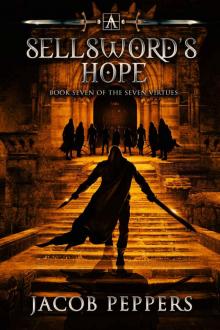 A Sellsword's Hope
A Sellsword's Hope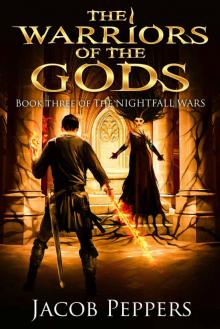 The Warriors of the Gods
The Warriors of the Gods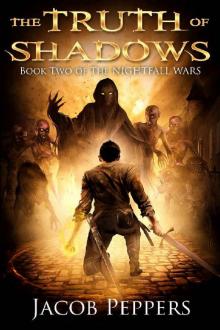 The Truth of Shadows
The Truth of Shadows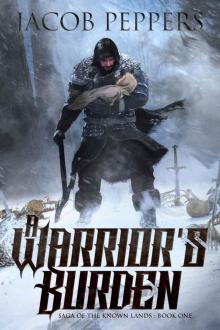 A Warrior's Burden: Book One of Saga of the Known Lands
A Warrior's Burden: Book One of Saga of the Known Lands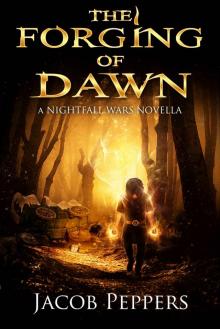 The Forging of Dawn
The Forging of Dawn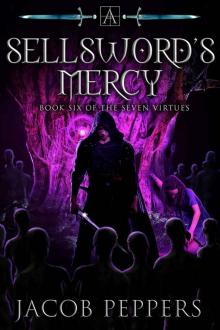 A Sellsword's Mercy
A Sellsword's Mercy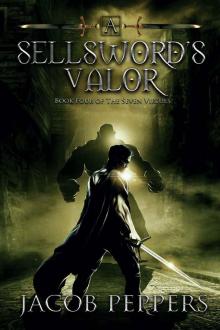 A Sellsword's Valor
A Sellsword's Valor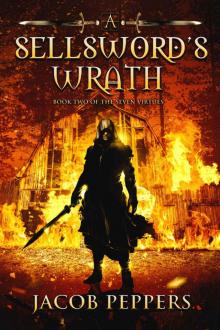 A Sellsword's Wrath
A Sellsword's Wrath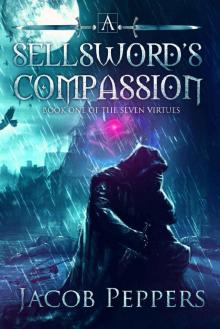 A Sellsword's Compassion_Book One of the Seven Virtues
A Sellsword's Compassion_Book One of the Seven Virtues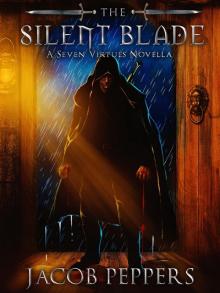 The Silent Blade: A Seven Virtues Novella
The Silent Blade: A Seven Virtues Novella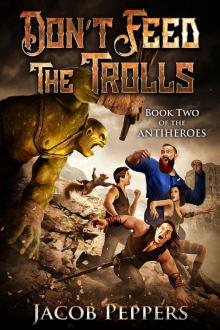 Don't Feed the Trolls
Don't Feed the Trolls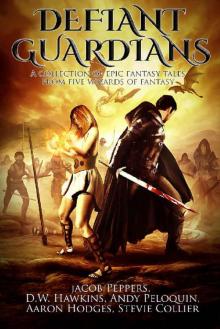 Defiant Guardians Anthology
Defiant Guardians Anthology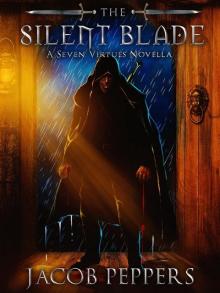 The Silent Blade
The Silent Blade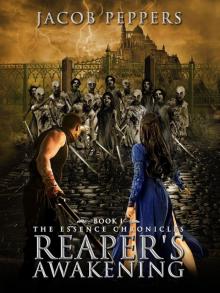 Reaper's Awakening
Reaper's Awakening